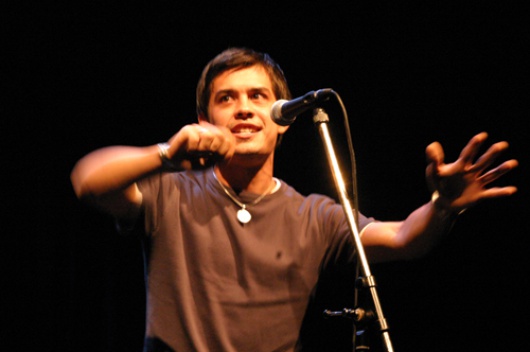
Ken Yamamoto: 'Being German is a cultural identity'
Published on
Translation by:
Nabeelah ShabbirThe Paris-born Japanese-German slam poet, 30, lives in Mainz, is married to a Colombian and has more than plenty to recite on what Europe means to him
Overwrought at sunset,
In many sunsets
The poem is the only place
Where clarity reigns
'Zwielicht' ('Twilight'),
Ken Yamamoto
A relaxed young man sits opposite me in a cafe the day after his performance at the Berlin Literature Festival. Ken Yamamoto, the son of a Japanese father and a German mother, belongs to a new generation of lyricists. Reading his 'Lyrik + Spoken Word Poetry' blog, it's hard to believe that behind these lines there's a poet who not only knows how to improvise the beautiful verse onstage, but how to deliver them to a huge audience. In the flesh, he's an entertaining young man with a message.
'It was just great,' Yamamoto raves about the poetry slam event that took place the night before. 'Artists from different countries performed in their native languages – and it worked.' Poetry slam is a 23-year-old US originating literary competition, where individuals take the stage to recite or read their original poetry. 'You need to work your body language much more when your words aren't being translated. Communication transcends language - it's more about the atmosphere you create.'
Yamamoto tours various European countries, having recently appeared in Switzerland and Italy. I ask him why he slams in German, when he spent the first year of his life in Paris, having breathed in its culture and language from a very young age. 'German is my native language, it's what I speak with my mum,' he reflects. 'But I still have a connection with France.' After his parents separated when he was a teenager, he moved to Baden-Baden (near the French border in south Germany) with his mother. 'Half the family stayed in Paris. French is the only language I speak with my father, as unfortunately I can't speak Japanese.'
 'People give a shit about poetry,' the unfortunate Yamamoto tells an insistent hacker on his blog. 'I wish I would be more important but sadly my (absent) success keeps me down to earth' (Photo: www.kenyamamoto.com/ Flickr)
'People give a shit about poetry,' the unfortunate Yamamoto tells an insistent hacker on his blog. 'I wish I would be more important but sadly my (absent) success keeps me down to earth' (Photo: www.kenyamamoto.com/ Flickr)
Billion fragments of life and love
It was around this time when Yamamoto discovered literature, devouring an anthology of French poetry that his mother gave him as a present. His first baby steps towards being a poet followed shortly thereafter. 'Of course it was a teenage angst type of poetry, but I got better and better with time.' He dropped studying, which he did more out of duty than any real interest, and began to prepare his first live poetry readings. 'My poems are more aggressive when I present them as opposed to how they are in their written word. You have to captivate your audience.'
Yamamoto knows that performing poetry is a paradox. 'There's always this discrepancy between that intimate moment where you write and then the public moment where you recite. It's also hard to plant yourself before an audience when your poem is heavily autobiographical.' Yamamoto cites his surroundings as his inspiration. 'There's only ever the same few themes – love, life. But from these very select notions you can come up with a billion poems.'
Someone with such an interesting CV who does what he always wanted to do – does this kind of person still have dreams? 'Of course! I want more prominent people to try slamming. Comedy and laughter is cool, but it would be nice if people were less scared of speaking about subjects which aren't particularly entertaining.'
Five-dimenstional cultural identity
Yamamoto seems to be expecting my overdue question on what his view on Europe is, considering his multicultural background and voice in the slamming business. He promises to be brief – which he doesn't quite manage. 'I've definitely got something to say about that. Beginning with Germany, I'm married to a Colombian, and the majority of my friends have surnames with foreign roots. It's a great mix of cultures. Being German isn't anything to do with my blood, it's a cultural identity.' Does he see himself as a German? 'Actually, I feel like I am a cultural mix. But when I was in Colombia, I noticed that I was German for the first time, which actually kind of shocked me.'
Yamamoto isn't bleating on in an I have a dream thread. 'It would be nicer if Germans didn't close themselves up despite phenomenons like the fear of terror. Yes there is usually a good reason behind it, but it inhibits attitudes. We should instead try to learn how to value this beautiful reality that is cultural diversity. That also goes for immigrants and the children of immigrants, who unfortunately still too often don't integrate themselves, like many of my friends. I am really happy if my children are born with a three-, four- or five-dimensional cultural identity.
The same goes for Europe, which must let itself grow together more strongly. European citizens should see things more globally rather than just through a nationalist, narrow-minded view. They should also define who they are as Europeans. That happened for Yamamoto a long time ago during an Italian holiday when the Euro was launched in 2002. 'I was with a bunch of Europeans and we wanted to buy beer. It used to always be an eternal confusion of sorting through each other's various currencies and then the exhausting process of handing everyone their change back. This time it was all so easy! Five euros from one person, ten from me, go get the beers. The euro is the catalyst for a European common feeling - a textbook example, or like something out of a poetry anthology.
Ken Yamamoto: “Jail House Blues” (WDR)
Video: (rockanella/ YouTube)
Homepage photo: (spoken_yamamoto/ Flickr)
In-text photo: (www.kenyamamoto.com)
Translated from Ken Yamamoto: 'Mehr Menschen mit wichtigen Anliegen sollten sich in den Slam trauen'



